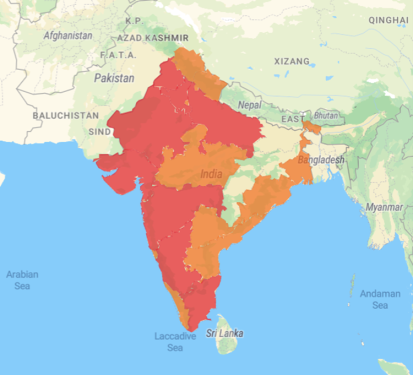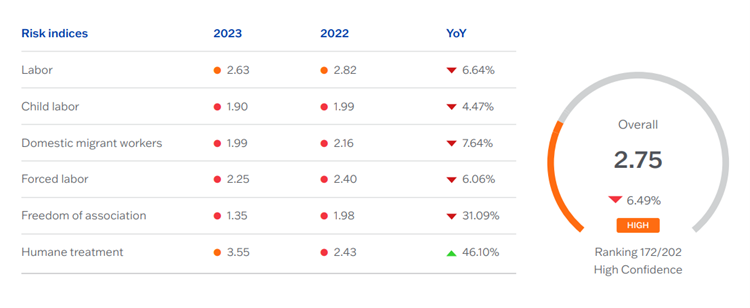India’s ESG Risk Could Threaten Supply Chains as the Country Becomes a Global Superpower
As India emerges as a critical cog in the global value chain, the escalating ESG (Environmental, Social, and Governance) risks in the country pose a threat to the sustainability of international supply chains. The South Asian nation recently surpassed China to become the world’s most populous country and is becoming increasingly vital to businesses. Although India’s economy is booming, sourcing executives must take a closer look at the critical risks associated with suppliers operating in the country.
India overall supply chain ESG risk heat map

India and the Global Supply Chain
India’s economy is dynamic and export driven. India’s massive population and abundance of resources contribute to its essential place in global markets. The country boasts a vast manufacturing output – ranging from gemstones and pharmaceutical products to machinery and consumer electronics. India is often referred to as the “pharmacy of the world”: so-called for its status as the largest provider of generic drugs globally. This was further underscored during Covid-19 when India supplied medicines and vaccines to various countries. India’s textile and garment industry is also a major player in the global supply chain, as the nation is one of the largest producers of cotton and silk.
DOWNLOAD THE 2023 SUPPLY CHAIN ESG RISK RATINGS REPORT HERE
While India’s production system fuels global markets, the country faces serious issues around air emissions, building safety, child labor, the treatment of domestic migrant workers, and constraints on freedom of association. The disconnect between India’s economic ascendancy and its ESG challenges requires a more aggressive approach to risk monitoring and mitigation in the country.
Extreme Risk Levels for Air Emissions Management and Worker Rights in India
India’s economy reflects poor ESG management. We find serious health, labor, and environmental problems in audit data, with several ESG risk indices identified as extreme risk there. The air emissions risk in the country, for example, stands alarmingly high, possibly due to the heavy industries prevalent in the region. Likewise, the safety of the buildings housing these production facilities is in question, creating a hazardous environment for workers. One of the most disconcerting revelations is the persistent problem of child labor, indicative of social imbalances and regulatory oversight. The situation for domestic migrant workers is also dire, as they face exploitation and lack of protection.
Indian Supply Chain Risk Profile, ELEVATE 2023

The freedom to associate for workers and voice grievances is also severely limited, stifling any potential for collective redress. This particular supply chain risk index saw a 31% drop in the last year, one of the most significant drops of its labor risk indices. Recent stories discovered by our media-scanning tool Sentinel echo this data, pointing to a web of ESG issues prevalent with suppliers in India. Many international brands operating in the country have been reported for not taking adequate steps to address wage theft in the garment industry. Brands have been found in breach of local minimum wage rules, underpaying workers, and promising to pay overdue allowances.
Other headlines highlight the plight of migrant workers during the Covid-19 pandemic, facing non-payment of wages and restrictions on movement.
Emerging Regulation May Address India’s Supply Chain ESG Risk
India’s role in global supply chains is likely to continue growing, especially as it invests in infrastructure, improves its business environment, and capitalizes on shifts in global trade patterns. Recent shifts in global trade dynamics are also leading many multinational companies to diversify their supply chains and increase production in countries outside China, with India being a viable alternative.
The ESG regulatory framework in India is fragmented and has not yet been efficiently implemented to compensate for the high levels of risk. The Securities and Exchange Board of India (SEBI) is expected to adopt a principles-based, rather than prescriptive, approach in its first set of rules for rating a company on ESG issues. This approach would allow such scores to be assigned to more companies.
Contact us to find out more about India’s inherent ESG risk to your supply chain and how you can better build your responsible sourcing program.
DOWNLOAD THE 2023 SUPPLY CHAIN ESG RISK RATINGS REPORT HERE
These blogs are written by ELEVATE staff members or associates and the views and opinions expressed are not necessarily those of ELEVATE.
About the author
